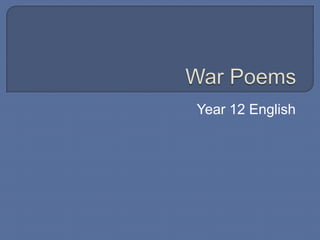
Year 12 English
- 1. War Poems Year 12 English
- 2. Wilfred Owen Captain in the British Army Fought in the First World War Witnessed the atrocities of war first hand. For this reason he wanted to dispel the notions associated with patriotism and nationalism that were propagated by the media during his lifetime. This is important.
- 3. His poetry portrays war as a dehumanising and horrific event to emphasise the real human loss. He wants to emphasise the wasted lives by humanising the guns and comparing the soldiers to beggars that might pass unnoticed on the street, or even ignored. You can not ignore the horrors of war.
- 5. The Poet Gained entry (First Class) into University Was pretty poor and worked as a teacher before enlisting. On 21 October 1915, he enlisted in the Artists' RiflesOfficers' Training Corps. On 4 June 1916 he was commissioned as a second lieutenant (on probation) in The Manchester Regiment.[3] Owen started the war as a cheerful and optimistic man, but he soon changed forever. Initially, he held his troops in contempt for their loutish behaviour, and wrote to his mother calling his company "expressionless lumps".[4]
- 7. However, Owen's outlook on the war was to be changed dramatically after two traumatic experiences. Firstly, he was blown high into the air by a trench mortar, landing in the remains of a fellow officer. Soon after, he became trapped for days in an old German dugout. After these two events, Owen was diagnosed as suffering from shell shock and sent to Craiglockhart War Hospital in Edinburgh for treatment.
- 9. This is where he met fellow poet Siegfried Sassoon, an encounter which was to transform Owen's life. After a period of convalescence in Scotland, then a short spell working as a teacher in nearby Tynecastle High School, he returned to the war. In March 1918, he was posted to the Northern Command Depot at Ripon.[5] He composed some poems here.
- 11. After returning to the front, Owen led units of the Second Manchesters on 1 October 1918 to storm a number of enemy strong points near the village of Joncourt. Only one week before the end of the war, whilst attempting to traverse a canal, he was shot in the head by an enemy rifle and was killed. The news of his death, on 4 November 1918, was to be given to his mother on Armistice Day. For his courage and leadership in the Joncourt action, he was awarded the Military Cross, an award which he had always sought in order to justify himself as a war poet, but the award was not gazetted until 15 February 1919.[6] The citation followed on 30 July 1919
- 13. http://en.wikipedia.org/wiki/Wilfred_Owen That’s where I got the information.
- 15. Trench warfare Commonly, considered ‘stalemate warfare’.